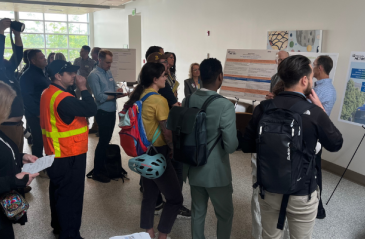
The information barriers holding back climate action and how to break them

Data analysis is not always front and centre for policymakers
Share articleTime pressure does not always give policymakers the necessary space
Share articlePoliticians are increasingly using and reliant on data to guide their decision-making
Share articleWe put our vision for government into practice through learning partner projects that align with our values and help reimagine government so that it works for everyone.
“I'm a government data geek,” admits Kevin Donahue.
Not long ago such a statement would have been quite unusual for a government professional. But those days, thankfully, are long gone. Today's generation of public servants are increasingly reliant on the myriad sources of data that now underpin the services, decisions and systems that course through corridors of power around the world.
Donahue is no recent convert to this new era. Currently serving as deputy city administrator of Washington, DC, he has dedicated much of his career to seeking operational improvements in a variety of data-based roles in both the district and federal governments.
Having previously led the federal government's Performance Improvement Council - now headed up by Kate Josephs - Donahue has long championed the importance of performance metrics and analytics in driving decisions. While it's a stance that has become progressively easier over time, he admits that data analysis is not always front and centre for everyone in government service.
“I find that there is a natural pull on people's time and attention in government, and it's typically not to ‘good data',” he concedes. “Good data is a discipline that must be maintained. The natural pull of time and energy is to the crisis - this could be responding to an email or responding to a news story or responding to something that has gone wrong in your jurisdiction that has to get addressed immediately.”
He goes on to say that this time pressure does not give policymakers the necessary space to take a step back and consider problems from a strategic perspective. “The discipline of data means that you have to have data,” he explains. “But it needs to be good data, and you have to have the intellectual discipline to create some breathing room in one's day, and in one's week, to be able to look at numbers that enable you to have a much more factually grounded view of where the problems are.”
Prior to his federal career, Donahue started and oversaw DC's CapStat programme, leading the effort to drive improvements in core city functions. He says that with data more available than ever before, the challenge now is to identify the most relevant pieces of information that can aid decision-making. Quite a turnaround from the early days, it transpires.
“When I started in this line of work, data was not easy to come by,” he recalls. “Sometimes it did not exist in a coherent way. Sometimes there were technical or legal barriers to getting it. That challenge has evolved. They still reside, but now there is much more data and it is much more available. This is fuel for data-driven discussions, but can also pose risks for people and organisations to become too focused on the data as an end to itself. The challenge we have now is that there is so much data available, it is sometimes more difficult to understand the analytical perspective that is going to best drive the discussion. Data should never be the end unto itself, but instead should be a driver for better and faster decisions and for tracking outcomes.”
Donahue currently works for DC's mayor, Muriel Bowser, and believes that politicians, in their never ending quest for votes, increasingly understand the value of data in helping them achieve results for their constituents - but that's only half the battle.
“The burden that is placed on individuals in my line of work is demonstrating how using better data can deliver something that without it a politician would struggle to deliver,” he explains. “I have never come across a politician who is not at least open-minded toward using data. If the politician after a year or two loses interest in data, it's typically because they did not see how data is connected to results. But I have an optimistic lens on politicians. They like results and, if you're creative in how you use data, you can show to almost any politician the role that data can play.”
As DC's deputy city administrator, much of Donahue's current role sees him focusing on crime reduction throughout the District and, again, the challenge here is not a lack of data. “We know a tremendous amount about the crime we have, the factors driving it, the individuals involved, the individuals at risk,” he points out. “The challenge we have is how to use this common information. We want to create strategies that cut across organisational lines and hierarchies, so that our human and health services teams can work closely with law enforcement - and vice versa - to reduce crime in our neighbourhoods.”
The bottom line for Donahue and others like him is that everything should come down to what can improve citizen outcomes. “We seek to empower employees who are delivering services, so that they can use data and share it,” he concludes. “They are open to this, but part of my role is to find out how we can make it effectively work. I started off as a data analyst, and on some level will always be one, but you can never lose sight of the purpose of data, which is to inform the decisions that lead to the outcomes and impact we seek.”











